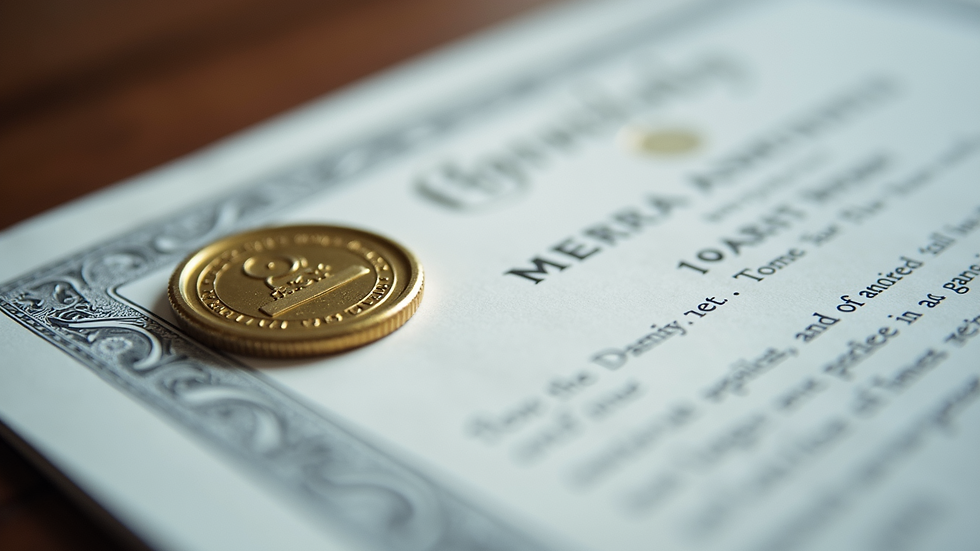Certificate Attestation: A Complete Guide for UAE
- mofa attestation service
- Jul 23
- 4 min read
Navigating the world of document requirements can be challenging, especially for expatriates or individuals seeking to work, study, or live in the UAE. One critical process that often arises is certificate attestation. This guide outlines everything you need to know about the process, importance, and steps of certificate attestation in the UAE.
UAE Certificate Attestation ( Authentication )
Certificate authentication is a crucial requirement for numerous individuals moving into the UAE for employment or educational purposes. Whether it’s an academic certificate, marriage certificate, or any other document, authenticating these documents is essential.
The UAE government requires that foreign documents be attested and verified to ensure their legitimacy. This process not only protects the recipient but also upholds the standards of the UAE's legal system.

In essence, without certificate attestation, individuals might face significant challenges in obtaining visas, employment, or higher education in the UAE.
Importance of Certificate Attestation
Understanding why certificate attestation is vital can help ease the process. Here are several important reasons:
Legal Requirement: The UAE government mandates document attestation for expats. This requirement ensures that foreign documents comply with local laws.
Facilitates Communication: Attested documents can be recognized by institutions, employers, and legal entities in the UAE. This factor eliminates misunderstandings or disputes related to document authenticity.
Streamlines Visa Processes: Visa applications often require proof of education or marital status, necessitating document attestation. Failing to provide attested documents can result in application delays or denials.
Trustworthiness: Having documents attested adds a layer of trust in a business relationship, assuring parties that the information presented is valid and verified.
In summary, certificate attestation directly impacts your credibility and ease of settling or working in the UAE.

How to Attest a Document for the UAE?
Understanding the steps involved in attesting your documents can simplify the process considerably. Here is a step-by-step guide:
Step 1: Determine the Type of Document
Identify the document that needs attestation. This could range from:
Educational certificates (degrees, diplomas)
Professional certifications (licenses, permits)
Personal documents (marriage or birth certificates)
Step 2: Notarization
The first requirement is often notarization of the document in your home country. This step certifies that the document is genuine and that the signatures are legitimate.
Step 3: Authentication by the Home Country
Once notarized, the document must be authenticated by the relevant government department in your home country, usually the Ministry of Foreign Affairs or a similar authority.
Step 4: UAE Embassy/Consulate Attestation
After authentication, the next step involves getting the document attested by the UAE embassy or consulate in your home country. This step ensures that the UAE recognizes the validity of the document.
Step 5: Ministry of Foreign Affairs in the UAE
Upon arrival in the UAE, you will be required to further attest the document with the UAE's Ministry of Foreign Affairs and International Cooperation (MoFAIC). Ensure you bring original documents along with copies during this step.
Step 6: Final Verification
The last step is to ensure that the attestation is complete. This verification can typically be done through the Ministry's online services or by visiting their office.

Common Documents Requiring Attestation
Several types of documents typically require attestation for entry or residency in the UAE. Here are some common documents:
Educational Certificates: Degrees, diplomas, or any educational achievements need to be attested for employment or further studies.
Birth Certificates: Necessary for residency visa applications for children.
Marriage Certificates: Required for family visa applications and to verify marital status.
These documents not only facilitate a smoother immigration process but also ensure the validity of your claims when entering the UAE.
Common Challenges in the Attestation Process
While the steps for document attestation are straightforward, there can still be several hurdles:
Time-Consuming: The entire attestation process can take time, from obtaining notarization to final verification in the UAE. Planning ahead is crucial.
Complex Regulations: Each country may have different regulations on document notarization and authentication, which can complicate the process.
Costs Involved: Costs for notarization, embassy fees, and UAE Ministry fees can accumulate, making it essential to budget for the process.
Language Barriers: Depending on your native language, some documents may require translations which must also be certified.
To navigate these challenges, it is advisable to engage with professional attestation services that specialize in UAE requirements. They can save you time, effort, and potential pitfalls in the process.
Final Steps and Recommendations
Once you have successfully attested your documents, keep copies of all your papers and receipts for record-keeping. You never know when they may come in handy, either for future visa applications or other formal uses.
In summary, understanding the intricacies of the certificate attestation process is essential for anyone planning to move to or work in the UAE. By following the outlined steps and being aware of potential hurdles, you can navigate this process efficiently.
For comprehensive information on certificate attestation and to assist you further, consider visiting MoFA UAE. By fully understanding and preparing your documents in advance, you can ensure a seamless transition into your new life in the UAE.
Comments